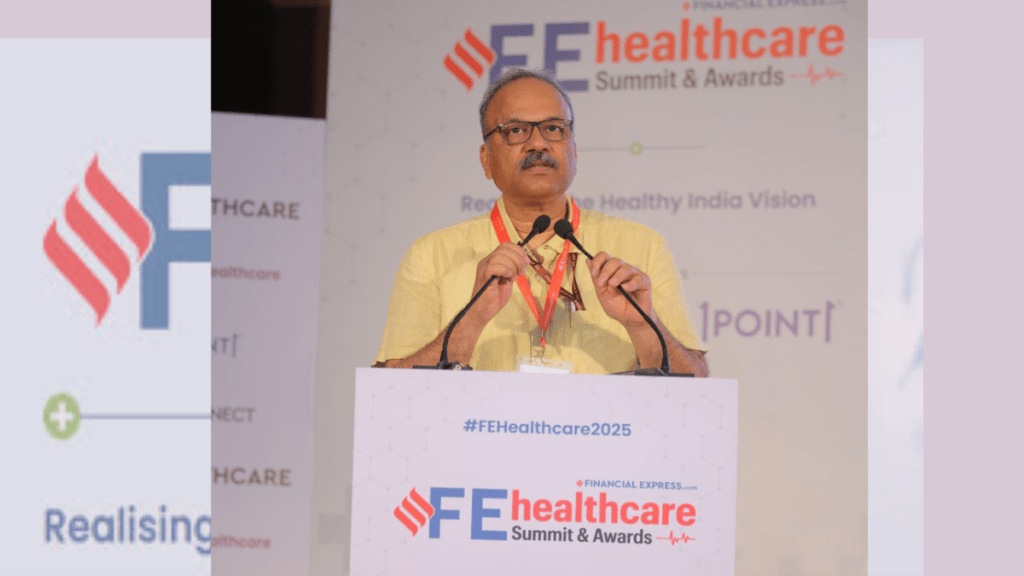Regulators tend to be a study in caution. It was therefore par-for-the-course to expect Dr Rajeev Singh Raghuvanshi, India’s drug controller general, to measure and weigh each word when speaking publicly. But, in what turned out to be a candid address at the Financial Express Healthcare Summit & Awards, 2025 on Wednesday, Dr Raghuvanshi delighted and also cautioned the medicine-makers of India.
This was with the drug regulator’s take on the approach to regulations, approvals, good manufacturing practices (including for the marginal, small and micro enterprises, who have been given more time to get their systems in place and comply). Apart from these, he spoke of the enablers that could ensure Indian drug-makers moved up the value chain and got well beyond being only the suppliers of generic medicines to the world.
The industry could, he said, expect to see a regulator that was getting lighter on regulations but heavy on execution. In a world that needed innovative drugs that were also affordable, he spoke of the regulator’s approach to granting approvals for innovative drugs. These being medicines that both impactful in their health outcomes and also more affordable than the near-matching options in markets abroad.
He interspersed his talk with phrases like ‘when context changes, content must also change’, ‘moving beyond generics’, ‘shift from volume to value’ ‘risk money has to move to India’ and an emphasis on ‘discovery research’ as the way forward. Many of these phrases staying with the representatives from the industry who found a regulator “willing to listen.” This was apparently felt crucial at a time when India was in the spotlight as a leading supplier of low-cost generics to the world but also not found wanting in quality even to regions outside of the highly regulated markets of the West.
For a regulator, who many in the industry, have for many years now, found hugely wanting in terms of men and material resources given the scale and size of India, Dr Raghuvanshi painted the picture of a regulatory environment that was “lighter on regulation but heavy on execution.” Apart from its effectiveness, this approach apparently would also enable it to “judiciously use” resources which were at its disposal to manage the system.
This would be backed by an emphasis on minimising human intervention. He said: “I am very happy and proud to say that about 99 per cent of our processes are now digital. We have almost come out of physical system of approving product or process or issue of any license, and that’s a huge shift from past, because that is actually helping us as a regulator.” He also reminded that “we are sitting with 15 global recognitions for Indian pharmacopeia.” And that “15 countries have now recognized Indian pharmacopeia. So that’s a big achievement. Last four years, when I shifted from corporate to the government system, we were at three, and today, the last week, we signed the 15th. And that’s a big achievement,” he said.
On the approach to drug approvals, he saw also a shift towards encouraging drug approvals that were innovative therapies but made available to the Indian audience at an affordable price. In this context, gave reference to the approvals given in the case of CAR-T cell therapy, an innovative and advanced immunotherapy for combating blood cancer. The cost of treatment has come down in India by 1/10th – costing around “Rs 3 crore in the US, it is now available in India at about Rs 30 lakh to Rs 40 lakh.”
Another point that seems to have resonated well with many from the industry was the non-availability to risk-capital in India. Considering that drug discovery research was the way forward for the Indian drug-makers in the journey taking them from volume-players to value-players in the global markets, he said, “we cannot do innovation because it is a risky business” and needs “risk money” but today, “we are not having enough risk money in the country.”
He also saw a shift underway in the approach to quality and the importance of this. “Lot of manufacturers have realised this and they are upgrading their systems,” he said.


